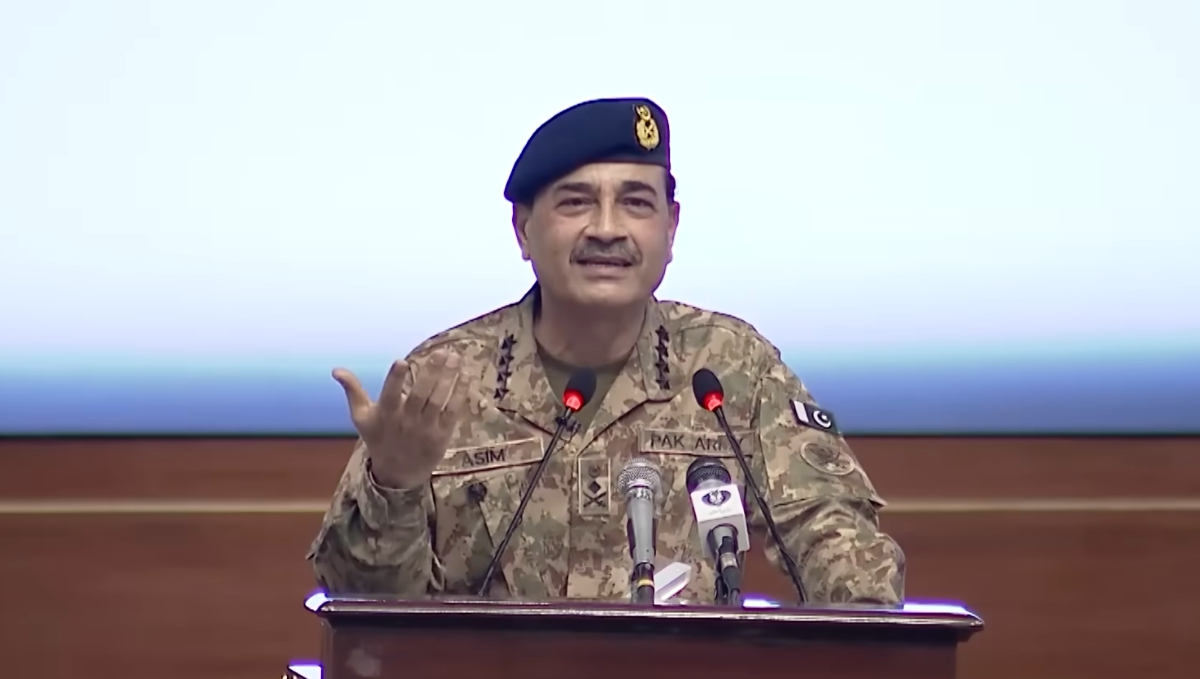As per ThePrint:
Field Marshal Asim Munir, Pakistan’s military chief, threatened to plunge the region into nuclear war should his country face an existential threat in a future war with India, saying “we are a nuclear nation, if we think we are going down, we’ll take half the world down with us.” The extraordinary remarks—the first nuclear threats known to have ever been delivered from the soil of the United States against a third country—were made at a black-tie dinner hosted for Munir by businessman Adnan Asad, who serves as honorary consul for his homeland in Tampa.
The Field Marshal followed up his nuclear threat, sources present at the dinner told ThePrint, with comments on the Indus Water Treaty, saying India’s decision to place it in abeyance could put 250 million at risk of starvation. “We will wait for India to build a dam, and when it does so, phir 10 missile sey faarigh kar dengey [we will destroy it with 10 missiles].”
“The Indus river is not the Indians’ family property. Humein missilon ki kami nahin hai, al-Hamdulillah [we have no shortage of missiles, Praise be to God],” Munir concluded.
Guests invited to the function were not allowed to carry cellphones or other digital device, and no text of the speech was circulated. ThePrint reconstructed the contents of the speech from the memory of several participants who were present.
Field Marshal Munir was in Florida to attend a retirement function for General Michael Kurilla, the outgoing commander of the United States Central Command (CENTCOM). A representative of the defence forces of Israel—a country with which Pakistan does not have diplomatic relations—was also present at the function.
Earlier, Munir had controversially been invited to meet with US President Donald Trump. This interaction caused disquiet among pro-democracy forces in Pakistan since no invitation has yet been extended to its Prime Minister or President.
An estimated 120 Florida-based members of the Pakistani diaspora were served a western-style dinner at the Grand Hyatt Hotel in Florida’s Tampa, beginning with Caesar salad, and followed by tomato bisque, a choice of chicken and salmon braised with herbs—all clearly marked to indicate the food was Halal.
The function began with a recitation of As-Saf verse 4 from the Quran, which asserts that “Allah loves those who fight in his cause in a row as though they are a [single] structure joined firmly.” Pakistan named its operations during the Four-Day War of May Bunyaanum Marsoos, after the verse. Following the Quranic recitation, Pakistan’s national anthem was played, the sources said.
Field Marshal Munir mocked India’s refusal to provide specific details of its losses during the Four-Day war. “The Indians should accept their losses,” Munir said, adding, “Sportsman spirit is a virtue.” He also said that he had offered for an inventory of Pakistan’s losses to be made public, as long as India also conducted a similar exercise.
The Pakistan army chief devoted a substantial part of his prepared speech, read from notes, to the war and its fallout.“Ek tweet karwaya tha with Surah Fil and a picture of [the industrialist] Mukesh Ambani to show them what we will do the next time,” he said. The verse Surah Fil describes how Allah dispatched birds to drop stones on an enemy’s battle elephants, reducing them “to chewed-up straw”.
“We’ll start from India’s East, where they have located their most valuable resources, and then move westwards,” Field Marshal Munir said.
Field Marshal Munir, a religious conservative who is the first chief of the Pakistan army to have a seminary education, has frequently used theological points to support his arguments. However, he also resorted to simpler metaphors for the benefit of his diaspora audience.
“I am going to use a crude analogy to explain the situation,” Field Marshal Munir went on. “India is shining Mercedes coming on a highway like Ferrari [sic], but we are a dump truck full of gravel. If the truck hits the car, who is going to be the loser?”
Field Marshal Munir took the opportunity to make the case for military involvement in Pakistani politics and strategic decision-making, directing many of his comments personally to Pakistan’s former ports and shipping minister Babar Khan Ghauri, who served under Prime Minister Yusuf Raza Gilani. “They say war is too serious to be left to the Generals, but politics is also too serious to be left to the politicians.”
The Field Marshal urged the diaspora to do more to support Pakistan. “Kisi ki maa kaali ho sakti hai, aur kisi ki dharti-maa kaali ho sakti hai, par maa maa hoti hai [someone’s mother might be dark-skinned, and the earth of someone’s motherland might be dark, but a mother is a mother],” he said, in a passage inflected with Hindi-film tropes.
Allah, he went on, would bless Pakistan with his bounty, because it is one of only two states founded on the basis of the Kalimah, the Islamic profession of faith. The first, Munir argued, was the city-state of Medina founded by the Prophet Muhammad. He—incorrectly—asserted that Medina was renamed Tayyiba, or blessed.
The second such state, the Field Marshal said, was Pakistan, and God would reward it with energy and natural resources, just as the earth under Medina had been. He described finds of rare earth metals, minerals and hydrocarbons that are purported to have recently been made in Pakistan.
Field Marshal Munir noted India’s recent diplomatic tensions with the United States and joked that Pakistan should begin offering masterclasses on balancing rival powers. “The real reason for our success is that we are not misers,” he said. “If someone does good work, we praise and appreciate them. That is why we nominated President Donald Trump for the Nobel Prize.”













